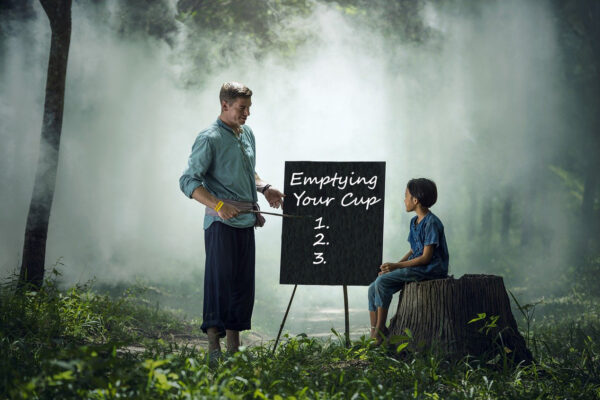
3 Situations Where You Should Empty Your Cup
There is a great story about a wise old teacher and his student. The teacher worked patiently trying to impart his knowledge and wisdom to the student, but the student always thought he knew better and was not taking in the lessons. After a fruitless morning of teaching they sat down together to drink tea. The student wasn’t really paying attention as he held out his cup for the teacher to fill. The teacher began pouring the tea for his student and when the tea reached the top of the cup he did not stop. As the hot liquid streamed over the sides of the cup and onto the ground, some of it splashed onto the student’s hand. This quickly got the attention of the student who said – “Teacher, please stop pouring the tea, can’t you see that my cup is already full and cannot fit anymore in it”. The teacher replied “Yes exactly, and you are just like this cup. So full of ideas and opinions that you cannot take in anything more that I have to give you. Come back to me when your cup is empty”.

It’s a great object lesson that we can draw many insights from. The most common lesson that is drawn from this is that you must let go of what you think you already know in order to take in new knowledge. There is a lot more we can gain from this object lesson though, so this article will explore some of those other lessons we can learn from the idea of “emptying our cup”.
Overcoming reservations about emptying your cup
While “emptying your cup” sounds like a very simple thing that all honest seekers of knowledge should be willing to do, in practice people are often resistant to actually doing it – and for good reason. Over a lifetime of learning, they may have gathered much valuable knowledge and experience, and it does not seem wise or prudent to simply throw all of that away so that they can experience something new, which they may not even enjoy or find value in if they have not tasted it before.
If we look a little deeper into this analogy though, we find that there is not really a conflict here. When we empty our cup, we do not also empty all of the fluids from our body… just the ones we are in the process of tasting and drinking in the current moment. To empty our cup does not mean that we must also empty every memory and piece of knowledge from our being, it simply means to empty our current focus and awareness. We can still retain all of our knowledge and experience for future reference, while clearing our senses and focus to fully experience and benefit from the present moment. When we understand this, we can empty our cup without hesitation or regret knowing that our past learning is not lost. It is still retained, respected, and valued.
In the following sections we will look at three different situations where it is beneficial to empty your cup before allowing it to be filled with something new.
1. Your cup is filled with something GOOD
Sometimes when people think about emptying their cup, they assume that this implies in some way that what they already have in their cup is bad in someway and needs to be thrown away so that it can be replaced by something better. This is often not the case. Many times the cup is just FULL. Being full with truly excellent things is still an impediment to being able to take in something new – there simply isn’t room to take it in.
In this situation, to empty your cup may not mean that you throw away its contents. Instead it may mean that you finish drinking them so that you can gain and retain their benefits before trying to fit something else in as well.

This even applies to taking in more from the same source. If you haven’t finished drinking what you have already received, each time you go back you will only be able to take a partial serving – topping up what is already in your cup. If you take the time to empty your cup first – consuming and absorbing what you already have, then each time you go for more you will be able to get a FULL serving. Your learning will be richer and progress more smoothly.
2. Your cup is filled with something BAD
If your cup is filled with something bad, then clearly you should simply throw this out before seeking to fill it with something better so that it does not harm you. It is surprising though how often we are reluctant to throw out something that we know is not good for us, instead just looking for the new while not fully letting go of the old yet. If we do this we run the risk of the bad contaminating the good. Much better to just empty it out and maybe even spend some time washing the cup so that it is fresh and clean and ready to take in something that will be good for you.
We can apply this in many ways in our lives, not just to knowledge. Many opportunities can only be taken when we are clean, clear, and ready for them. If we are not ready for the opportunity, it will just pass on by… If we are stuck in a job where we are stressed and overworked, it is unlikely that we will be able to even see a good new work opportunity when it arises, let alone make ourselves available for it. If we are still embroiled in an unhealthy relationship, we won’t be available for a healthy relationship with someone else who may be more compatible when we meet them.
It can take a leap of faith to empty out what is not serving us, but sometimes that is what we need to do so that we can be ready to let in the new.
3. Your cup is filled with something DIFFERENT
This last situation is an interesting one, and in a way it combines aspects of the first two. You might have something good in your cup, and want to fill it with something else that is also good. But if you don’t empty what is already in your cup by either consuming it or discarding it – the mixture of the two may be bad…
For example, if you were drinking coffee and then decide that you would like to try some orange juice, and don’t empty the coffee from your cup first before pouring the orange juice in – you may think that there is something wrong with the orange juice and that it tastes funny… Of course this doesn’t mean that there is anything wrong with the orange juice. It just means that you have mixed two things that don’t go well together.
This occurs frequently in learning situations. People will try something new, but try to do it kind of they way the are used to doing something else, or try to interpret the knew knowledge based on pre-existing ideas – and then it doesn’t work or make sense the way it should. It is very easy in this type of situation to then assume that there is something wrong or not very good about the new learning, but the problem may not be with the new knowledge at all, it may be that it hasn’t been given a chance to be experienced and understood in its own right without being tainted or confused with something else. In doing this we may mistakenly reject and throw out as bad or defective, something that is actually very good, enjoyable, and even beneficial when consumed appropriately.
This is a clear situation where we need to make sure that we empty and clean our cup before trying to take in something new, so that we can judge it fairly on its own merits. This doesn’t mean that you can’t go back to drinking coffee after you have tasted the orange juice, just that you need to empty your cup and cleanse your palate first so that you can truly appreciate it for what it is. It actually also doesn’t mean that you can’t mix together different drinks (or types of knowledge). Rather, after having tried each part separately and properly understanding, it leaves you in a better position to mix and combine them together in ways that are harmonious, beneficial, and pleasing to the palate. Instead of mixing coffee and orange juice, you might instead combine coffee with something like… maybe milk? and find that the result is pleasing. Orange juice you might continue to drink by itself, or after trying some other drinks you might think that it would mix well with mango juice, or lemonade…

Conclusion
I hope that you have enjoyed this article and it has given you a new appreciation of the lessons from the old saying of emptying your cup. These lessons are particularly relevant to learning qigong. There are so many different styles and so much diversity of practice. There are many exercises and principles that are referred to by the same or similar names, but are actually referring to things that are quite different, and also exercises and principles that are referred to by different names when there are actually referring to the same thing. It is amazing to experience all of this diversity, but it can be confusing to navigate your way through it. To truly understand each new practice or principle we encounter we first need to make sure that we empty and clean our cup so that we can experience it with fresh senses untainted by our previous experience. When we do this we will find that we are able to gain a much clearer understanding of them and how they fit with what we have previously learned, so that we can gain the full benefit of them in our lives.
If you have enjoyed this article, make sure to sign up for our email newsletter below so that you can receive our latest updates when we publish more articles and news and announcements about qigong.
2 Comments. Leave new
Great article, may I share this with my Tai Chi classes .
Glad you liked it. Yes feel free to share it with your class ????